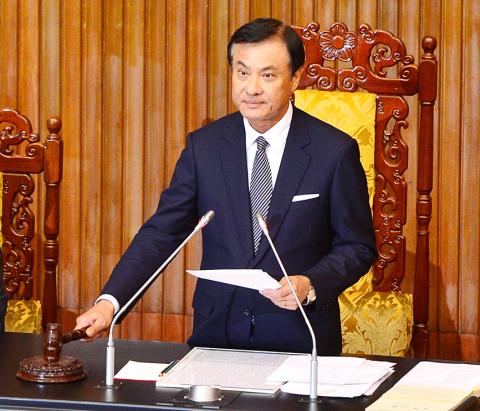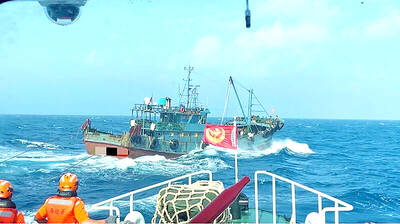Lawmakers yesterday approved amendments to the Referendum Act (公民投票法) to lower the legal voting age and slash the thresholds for initiating, seconding and passing referendums.
The Legislative Yuan yesterday reviewed several motions concerning seven disputed draft amendments.
A proposed amendment to Article 2, which states that issues stipulated in the Constitution — such as the nation’s official title and territory — are not to be decided through referendums, was passed with the support of the Democratic Progressive Party (DPP), the Chinese Nationalist Party (KMT) and the People First Party caucuses.

Photo: Wang Yi-sung, Taipei Times
The New Power Party’s (NPP) motion to extend the scope of the act to cover the Constitution’s contents and to allow a new Constitution to be written was struck down.
The amended Article 2 also grants people the right to propose — through a referendum — laws to be considered by city or county councils, and to amend or abolish local government-level autonomous acts.
This is a step up from the former rule, which granted people the right to amend or abolish lower-level autonomous regulations, which do not need approval from city or county councils.
All four caucuses lent their support to a draft amendment of Article 7, which lowers the legal voting age for referendums from 20 to 18, allowing it to advance to the third reading without a vote.
The threshold for initiation of national and regional referendums has been lowered from 0.005 percent of the electorate in the most recent presidential election, or about 90,000, to 0.0001 percent, or about 1,800.
The number of signatures required for a proposed referendum to pass its second stage — 5 percent of all eligible voters in the most recent president election, or about 900,000 — has been reduced to 1.5 percent, or about 280,000.
For a referendum to pass, 25 percent of the eligible voters must vote "yes."
A motion tabled by the KMT on Monday, which set the threshold at 20 percent, was vetoed.
A DPP motion to amend Article 13 to grant the Executive Yuan the right to propose referendums on major policies, proposing or vetoing a law was passed.
The amended act includes a new provision that allows signature drives, which are necessary for a referendum, to be conducted online.
According to the provision, the lead initiator of a referendum should request an authentication code when filing a request for an online signature drive with the Central Election Commission.
A KMT motion to implement absentee voting for referendums failed to obtain a majority vote.
A draft amendment by the NPP that seeks to have the president propose topics of “political negotiations” with Beijing as topics to be voted on in referendums before such negotiations are conducted was vetoed.
The DPP and the KMT said that such a regulatory measure should be stipulated in the proposed act on supervising cross-strait agreements, which the DPP has put on the back-burner to avoid worsening cross-strait ties.
NPP Executive Chairman Huang Kuo-chang (黃國昌) criticized the DPP over the outcome, saying its decision had forced President Tsai Ing-wen (蔡英文) to renege on a promise she made in 2011 during her first presidential election campaign to form a law on monitoring cross-strait political negotiations.
In response to the NPP’s proposals that the amendment should allow the public to vote on issues such as territorial changes and cross-strait negotiations, DPP spokeswoman Kolas Yotaka said those issues should be handled within the framework of the Constitution or a draft act on the cross-strait oversight mechanism.
While the KMT criticized the amendment for the exclusion of an absentee voting system, the DPP said it supports the idea of absentee voting and would legislate for its establishment with a separate law.
Additional reporting by Chen Wei-han

The Republic of China (ROC) is celebrating its 114th Double Ten National Day today, featuring military parades and a variety of performances and speeches in front of the Presidential Office in Taipei. The Taiwan Taiko Association opened the celebrations with a 100-drummer performance, including young percussionists. As per tradition, an air force Mirage 2000 fighter jet flew over the Presidential Office as a part of the performance. The Honor Guards of the ROC and its marching band also heralded in a military parade. Students from Taichung's Shin Min High School then followed with a colorful performance using floral imagery to represent Taiwan's alternate name

COGNITIVE WARFARE: Chinese fishing boats transmitting fake identification signals are meant to test Taiwan’s responses to different kinds of perceived incursions, a report said Chinese vessels are transmitting fake signals in Taiwan’s waters as a form of cognitive warfare, testing Taipei’s responses to various types of incursions, a report by the Institute for the Study of War said on Friday. Several Chinese fishing vessels transmitted fake automatic identification system (AIS) signals in Taiwan’s waters last month, with one mimicking a Russian warship and another impersonating a Chinese law enforcement vessel, the report said. Citing data from Starboard Maritime Intelligence, the report said that throughout August and last month, the Chinese fishing boat Minshiyu 06718 (閩獅漁06718) sailed through the Taiwan Strait while intermittently transmitting its own AIS

CHINESE INFILTRATION: Medical logistics is a lifeline during wartime and the reported CCP links of a major logistics company present a national security threat, an expert said The government would bolster its security check system to prevent China from infiltrating the nation’s medical cold chain, a national security official said yesterday. The official, who wished to stay anonymous, made the remarks after the Chinese-language magazine Mirror Media (鏡周刊) reported that Pharma Logistics (嘉里醫藥物流) is in charge of the medical logistics of about half of the nation’s major hospitals, including National Taiwan University Hospital and Taipei Veterans General Hospital. The company’s parent, Kerry TJ Logistics Co (嘉里大榮物流), is associated with the National Committee of the Chinese People’s Political Consultative Conference (CPPCC) and the Chinese People’s Liberation Army (PLA), the

COVETED PRIZE: The US president would be a peace prize laureate should he persuade Xi Jinping to abandon military aggression against Taiwan, William Lai said US President Donald Trump should get the Nobel Peace Prize should he be able to convince Chinese President Xi Jinping (習近平) to abandon the use of force against Taiwan, President William Lai (賴清德) told a conservative US radio show and podcast in an interview. The US is Taiwan’s most important international backer, despite the absence of formal ties, but since Trump took office earlier this year he has not announced any new arms sales to the nation. Trump could meet Xi at the APEC summit in South Korea on Oct. 31 and Nov. 1. Lai, speaking on The Clay Travis and Buck Sexton